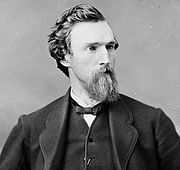James Young | |
|---|---|
 | |
| Ontario MPP | |
| In office 1879–1886 | |
| Preceded by | Hugh Finlayson |
| Succeeded by | William Bruce Wood |
| Constituency | Brant North |
| Member of the Canadian Parliament for Waterloo South | |
| In office 1867–1878 | |
| Preceded by | Riding established |
| Succeeded by | Samuel Merner |
| Personal details | |
| Born | May 24, 1835 Galt, Upper Canada |
| Died | January 29, 1913 (aged 77) Galt, Ontario |
| Political party | Liberal |
| Spouse(s) | Margaret McNaught (m. 1858) |
| Occupation | Businessman |
James Young (May 24, 1835 – January 29, 1913) was an Ontario businessman, journalist and politician. He represented Waterloo South in the House of Commons of Canada as a Liberal member from 1867 to 1878.
Early life
He was born in Galt in Upper Canada in 1835, the son of Scottish immigrants. He worked with a local newspaper and then bought several newspapers in the area in 1853 which he continued to publish until around 1863. He also wrote articles for other journals in the province. He became a partner in a wheel factory at Galt and also served on the town council.
Family
James Young married Margaret McNaught, daughter of John McNaught and his wife (née Kirkpatrick), on February 11, 1858. The couple resided at "Thornhill" in Galt, Ontario.[1]
Politics
In 1867, he was elected to the 1st Canadian Parliament for Waterloo South as a member of the Liberal Party; he was reelected in 1872 and 1874.
In 1879, he was elected to represent Brant North in the Legislative Assembly of Ontario. He was appointed Treasurer and Commissioner of Agriculture in 1883, but resigned these posts later that year due to ill health. He opposed reciprocity in trade with the United States and supported an elected Senate.
Electoral record
| 1878 Canadian federal election: Waterloo South | ||||||||
|---|---|---|---|---|---|---|---|---|
| Party | Candidate | Votes | % | ±% | ||||
| Conservative | Samuel Merner | 1,468 | 50.76 | – | ||||
| Liberal | James Young | 1,424 | 49.24 | – | ||||
| Total valid votes | 2,892 | 100.0 | ||||||
| Conservative gain from Liberal | Swing | – | ||||||
Source(s) "Waterloo South, Ontario (1867-1968)". History of Federal Ridings Since 1867. Library of Parliament. Retrieved 5 September 2015. | ||||||||
| 1874 Canadian federal election: Waterloo South | ||||||||
|---|---|---|---|---|---|---|---|---|
| Party | Candidate | Votes | % | ±% | ||||
| Liberal | James Young | acclaimed | – | – | ||||
| Total valid votes | – | – | ||||||
| Liberal hold | Swing | – | ||||||
Source(s) "Waterloo South, Ontario (1867-1968)". History of Federal Ridings Since 1867. Library of Parliament. Retrieved 5 September 2015. | ||||||||
| 1872 Canadian federal election: Waterloo South | ||||||||
|---|---|---|---|---|---|---|---|---|
| Party | Candidate | Votes | % | ±% | ||||
| Liberal | James Young | acclaimed | – | – | ||||
| Total valid votes | – | – | ||||||
| Liberal hold | Swing | – | ||||||
Source(s) "Waterloo South, Ontario (1867-1968)". History of Federal Ridings Since 1867. Library of Parliament. Retrieved 5 September 2015. | ||||||||
| 1867 Canadian federal election: Waterloo South | ||||||||
|---|---|---|---|---|---|---|---|---|
| Party | Candidate | Votes | % | |||||
| Liberal | James Young | 1,324 | 58.02 | |||||
| Unknown | James Cowan | 958 | 41.98 | |||||
| Total valid votes | 2,282 | 100.0 | ||||||
Source(s) "Waterloo South, Ontario (1867-1968)". History of Federal Ridings Since 1867. Library of Parliament. Retrieved 5 September 2015. | ||||||||
Later life
After he retired from politics in 1886, he wrote a number of books dealing with Canadian history and politics, including Public men and public life in Canada, being recollections of parliament and the press, published in 1902. He died in Galt in 1913.
References
- ^ Morgan, Henry James, ed. (1903). Types of Canadian Women and of Women who are or have been Connected with Canada. Toronto: Williams Briggs. p. 354.
External links
- Richardson, Lynn E. (1998). "Young, James (1835-1913)". In Cook, Ramsay; Hamelin, Jean (eds.). Dictionary of Canadian Biography. XIV (1911–1920) (online ed.). University of Toronto Press.
- James Young – Parliament of Canada biography
- James Young – Ontario Legislative Assembly parliamentary history (archive)
- Ontario Heritage Trust Plaque